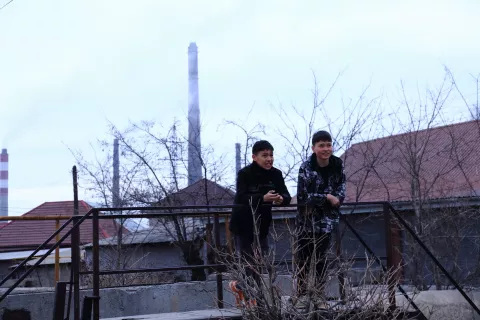European Immunization Week in Kyrgyzstan: Every vaccine dose matters to protect you and those you love

Bishkek, 24 April 2023 – European Immunization Week (EIW) begins today. This year, the week is organized under the umbrella of the WHO campaign “The Great Catch-Up", which aims to address the worrying decline in child vaccination rates worldwide.
The Ministry of Health of the Kyrgyz Republic, with the support of the World Health Organization (WHO) and the United Nations Children's Fund (UNICEF), is conducting the European Immunization Week in Kyrgyzstan from April 24 to April 30, 2023. The objective is to draw public attention to immunization as one of the main preventive measures to protect the population from infectious diseases. It will also highlight the importance of ensuring equitable and widespread access to vaccines, which contributes to a long and healthy life for everyone.
In terms of vaccination, the country has made significant progress. Together with other countries in the WHO European Region, Kyrgyzstan was certified polio-free in 2002. In 2019, WHO recognized Kyrgyzstan as a rubella-free country. In recent years, with GAVI, WHO and UNICEF support, several vaccines have been introduced into the national immunization schedule in Kyrgyzstan: pneumococcal conjugate vaccine in 2016, inactivated polio vaccine in 2018, rotavirus vaccine in 2019, and human papillomavirus (HPV) vaccine in 2022.
However, since 2020, there are reasons to believe that some children missed one or more doses of the vaccine, including the first dose of the measles-containing vaccine. It is important that parents understand the importance of giving their children a full course of vaccinations and take every opportunity to ensure that their children do not miss any dose of vaccines and in case, they do, that they can catch up as soon as possible.
“In the Kyrgyz Republic, the European Immunization Week 2023 aims to improve vaccination coverage and access to immunization for all age groups of the population, including immunization against COVID-19. Prior to the introduction of large-scale vaccination, major measles epidemics occurred approximately every 2–3 years and caused approximately 2.6 million deaths worldwide each year. Today, the measles situation in our country is becoming tense and preventive vaccination can stop the increase of the disease. We urge citizens to take measles and rubella immunization seriously.
Immunization protects not only people who have been vaccinated but also those for whom vaccination is contraindicated through herd immunity. I would like to note that along with the work of vaccination rooms, 76 mobile teams in all regions will be involved throughout the week to carry out routine and catch-up immunization of children and adults according to the preventive vaccination calendar. In addition, vaccination against COVID-19 of all ages of the population will be carried out in all hard-to-reach regions," said the Deputy Minister of the Ministry of Health of the Kyrgyz Republic Arykbaeva Bubuzhan Kamchybekovna.
“This year marks the 75th anniversary of the World Health Organization. Over the past decades, working with the Ministry of Health and our many partners, we have made great progress in improving the health of the population, and this is largely due to the effectiveness of vaccines and the successful work of the national immunization program. We are confident that, thanks to the ongoing cooperation between Kyrgyzstan, WHO and other partners, we will overcome the consequences of the COVID-19 pandemic and continue to implement activities aimed at protecting children and adults from dangerous diseases that can be prevented with vaccines,” said Dr. r Shahin Khuseinov, Special Representative of the WHO Regional Director in the Kyrgyz Republic.
“Just a couple of days ago, UNICEF launched a new global report on immunization under the title:” The State of the World’s Children 2023: For Every Child, Vaccination”. The report presents a series of solutions, from strengthening primary healthcare and health workforces to increasing efficiencies in health and immunization spending, addressing gender barriers and deploying new innovations in vaccines and vaccine products. Pairing these activities with community engagement and scaling new methods of combatting vaccine misinformation will be critical to ensure that communities are on-board in our efforts to recover childhood immunization coverage,” - said Cristina Brugiolo, Deputy Representative, UNICEF Kyrgyzstan.
***
Background information: Every year, the European Immunization Week (EIW) is held in the WHO European Region, aimed at promoting immunization, which is important for preventing diseases and protecting lives. EIW was first held in 2005 with only a few countries in the Region participating. The aim of the initiative was to increase vaccination coverage by spreading the word that every child needs and is entitled to protection against vaccine-preventable diseases. EIW immediately became one of the most visible and well-known public health campaigns in the Region.
Media contacts
About UNICEF
UNICEF promotes the rights and wellbeing of every child, in everything we do. Together with our partners, we work in 190 countries and territories to translate that commitment into practical action, focusing special effort on reaching the most vulnerable and excluded children, to the benefit of all children, everywhere.
For more information about UNICEF and its work for children, visit www.unicef.org.




